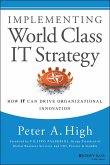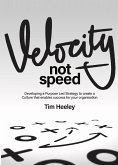Daniel Samson, Tom Bevington
Implementing Strategic Change (eBook, ePUB)
Managing Processes and Interfaces to Develop a Highly Productive Organization
33,95 €
33,95 €
inkl. MwSt.
Sofort per Download lieferbar

17 °P sammeln
33,95 €
Als Download kaufen

33,95 €
inkl. MwSt.
Sofort per Download lieferbar

17 °P sammeln
Jetzt verschenken
Alle Infos zum eBook verschenken
33,95 €
inkl. MwSt.
Sofort per Download lieferbar
Alle Infos zum eBook verschenken

17 °P sammeln
Daniel Samson, Tom Bevington
Implementing Strategic Change (eBook, ePUB)
Managing Processes and Interfaces to Develop a Highly Productive Organization
- Format: ePub
- Merkliste
- Auf die Merkliste
- Bewerten Bewerten
- Teilen
- Produkt teilen
- Produkterinnerung
- Produkterinnerung

Bitte loggen Sie sich zunächst in Ihr Kundenkonto ein oder registrieren Sie sich bei
bücher.de, um das eBook-Abo tolino select nutzen zu können.
Hier können Sie sich einloggen
Hier können Sie sich einloggen
Sie sind bereits eingeloggt. Klicken Sie auf 2. tolino select Abo, um fortzufahren.

Bitte loggen Sie sich zunächst in Ihr Kundenkonto ein oder registrieren Sie sich bei bücher.de, um das eBook-Abo tolino select nutzen zu können.
One of the key success factors for any organization is effective strategic change - to ensure adaptability and increase productivity. Despite its importance, most change management projects fail or only partly deliver on their promise, the missing link often being the conflict between boardroom strategic initiatives and the working process design of the company. Implementing Strategic Change shows that most of this conflict occurs during interfacing activity - the seemly small activities such as chasing, following up and seeking permission to proceed that help drive a process forward can make…mehr
- Geräte: eReader
- mit Kopierschutz
- eBook Hilfe
- Größe: 4.67MB
- FamilySharing(5)
Andere Kunden interessierten sich auch für
![Implementing Hoshin Kanri (eBook, ePUB) Implementing Hoshin Kanri (eBook, ePUB)]() Anders MelanderImplementing Hoshin Kanri (eBook, ePUB)35,95 €
Anders MelanderImplementing Hoshin Kanri (eBook, ePUB)35,95 €![Strategic Planning: Developing and Implementing Strategic Plans to Achieve Long-Term Business Goals (eBook, ePUB) Strategic Planning: Developing and Implementing Strategic Plans to Achieve Long-Term Business Goals (eBook, ePUB)]() Gerard AsseyStrategic Planning: Developing and Implementing Strategic Plans to Achieve Long-Term Business Goals (eBook, ePUB)6,99 €
Gerard AsseyStrategic Planning: Developing and Implementing Strategic Plans to Achieve Long-Term Business Goals (eBook, ePUB)6,99 €![Implementing World Class IT Strategy (eBook, ePUB) Implementing World Class IT Strategy (eBook, ePUB)]() Peter A. HighImplementing World Class IT Strategy (eBook, ePUB)36,99 €
Peter A. HighImplementing World Class IT Strategy (eBook, ePUB)36,99 €![Bioinspired Strategic Design (eBook, ePUB) Bioinspired Strategic Design (eBook, ePUB)]() Daniel J. FinkenstadtBioinspired Strategic Design (eBook, ePUB)43,95 €
Daniel J. FinkenstadtBioinspired Strategic Design (eBook, ePUB)43,95 €![Velocity not Speed (eBook, ePUB) Velocity not Speed (eBook, ePUB)]() Tim HeeleyVelocity not Speed (eBook, ePUB)8,49 €
Tim HeeleyVelocity not Speed (eBook, ePUB)8,49 €![Managing Organizational Change (eBook, ePUB) Managing Organizational Change (eBook, ePUB)]() Helen CampbellManaging Organizational Change (eBook, ePUB)25,95 €
Helen CampbellManaging Organizational Change (eBook, ePUB)25,95 €![The Alignment Advantage (eBook, ePUB) The Alignment Advantage (eBook, ePUB)]() Richard NugentThe Alignment Advantage (eBook, ePUB)16,95 €
Richard NugentThe Alignment Advantage (eBook, ePUB)16,95 €-
-
-
One of the key success factors for any organization is effective strategic change - to ensure adaptability and increase productivity. Despite its importance, most change management projects fail or only partly deliver on their promise, the missing link often being the conflict between boardroom strategic initiatives and the working process design of the company. Implementing Strategic Change shows that most of this conflict occurs during interfacing activity - the seemly small activities such as chasing, following up and seeking permission to proceed that help drive a process forward can make up to 80% of many employees workload. This book will show that business strategy and change implementation rely on deep and close process knowledge and help develop the framework for understanding and improving these activities in any organization.
Produktdetails
- Produktdetails
- Verlag: Kogan Page eBook
- Seitenzahl: 248
- Erscheinungstermin: 3. April 2012
- Englisch
- ISBN-13: 9780749465551
- Artikelnr.: 38222755
- Verlag: Kogan Page eBook
- Seitenzahl: 248
- Erscheinungstermin: 3. April 2012
- Englisch
- ISBN-13: 9780749465551
- Artikelnr.: 38222755
- Herstellerkennzeichnung Die Herstellerinformationen sind derzeit nicht verfügbar.
Tom Bevington is a partner in Bevington Group and its sister company Bevington Process Management Tools. He has experience in both technical and management roles in IT and was CEO of an international computer services organization with operations in 49 countries. Clients have included GE Capital, ANZ, Commonwealth Financial Services and Tower.
Professor Danny Samson is one of Australia's best known executive educators, having created and led many successful programs both in Australia and elsewhere. He is Professor of Management at the University of Melbourne and is Director of the Foundation for Sustainable Economic Development there.
Professor Danny Samson is one of Australia's best known executive educators, having created and led many successful programs both in Australia and elsewhere. He is Professor of Management at the University of Melbourne and is Director of the Foundation for Sustainable Economic Development there.
Foreword
Preface
Introduction
Organizational impact of toxic interfaces
The failure of strategic change
Interfaces are not the problem
Best practice using interface mapping
Too good to be true?
How much will this cost?
Does it work in practice?
01 Business strategy - rigorous formulation, routine underachievement
Objectives
Introduction
Only half a solution?
Two parts to the strategy - an uncomfortable truth
A need for a change in thinking
Increasing criticality of managing interfaces
Undocumented interfacing activities make up over 50 per cent of routine
work steps
Interfacing activities' invisibility
Interfacing activities and strategic impact
Century-old practices abound
Summary
02 Strategic outcomes from best-practice management principles
Objectives
Introduction
A complete set of management principles
Understanding the management principles
Link between best-practice principles and interfacing activity
Using principles to achieve staff and management alignment
Summary
Appendix
03 Making the change needs obvious - the critical role of interfacing
activities
Objectives
How it all started
Exploring interfacing activity
Mapping reality - the paradox
Searching for an approach to mapping interfacing activity
Documenting what really happens
Importance of missing interfacing activities
Confidence from interfacing activity data
The management challenge quantified
Summary
Appendix
04 Interfacing activities, business strategy and business process
innovation
Objectives
The need for strategic activity categorization
Relating value-added activities to a strategic framework
Support and core activities
Relationship between core activity and noise
Interfacing activity noise drives process innovation
Noise as an indicator of potential
Summary
05 Interface activity noise - the foundation of strategic change capability
Objective
The data
A huge opportunity
Outcome achievement
Situational dependency
Discretionary activity
Summary
06 Increasing performance
Objective
Continuous improvement or strategic process alignment?
Value revealed by interface mapping
Difficulties in addressing noise
Analysing noise drivers to achieve strategic outcomes
Summary
07 Organizational 'genomics' - strategic process analysis focused on
implementation
Objectives
Introduction
Need for a new 'genomic' framework - summary
The real issue with interface mapping
Organizational 'genomics'
How interface mapping meets the need
Analysing and using interface mapped data
Strategically defi ning business process change
Summary
08 Principles by which leading organizations drive change
Objectives
Introduction
Need for the deployment culture management principles
Exploring the deployment culture management principles
Contrasting approaches
Multi-organization process management
Summary
09 Using interface mapping to deliver performance
Objectives
Introduction
Relationship between interfacing activities and the management principles
Installing the principles and aligning business processes
Conclusions
10 Staying on top: maintaining business outcomes
Objectives
Introduction
Common approaches to business process change do not last
Continuous, strategic business process alignment
Interfacing activities continually change
Up-to-date interface maps
Essential features of an ongoing interface mapping programme
Month 1 deliverables
Determining change priorities strategically
Delivery of the required changes
Locking in the changes - BCIs
The last step
Conclusions
11 Definitions and an example of an interfacing mapping tool
Definitions
Interface mapping tool
References and Literature Researched
Index
Preface
Introduction
Organizational impact of toxic interfaces
The failure of strategic change
Interfaces are not the problem
Best practice using interface mapping
Too good to be true?
How much will this cost?
Does it work in practice?
01 Business strategy - rigorous formulation, routine underachievement
Objectives
Introduction
Only half a solution?
Two parts to the strategy - an uncomfortable truth
A need for a change in thinking
Increasing criticality of managing interfaces
Undocumented interfacing activities make up over 50 per cent of routine
work steps
Interfacing activities' invisibility
Interfacing activities and strategic impact
Century-old practices abound
Summary
02 Strategic outcomes from best-practice management principles
Objectives
Introduction
A complete set of management principles
Understanding the management principles
Link between best-practice principles and interfacing activity
Using principles to achieve staff and management alignment
Summary
Appendix
03 Making the change needs obvious - the critical role of interfacing
activities
Objectives
How it all started
Exploring interfacing activity
Mapping reality - the paradox
Searching for an approach to mapping interfacing activity
Documenting what really happens
Importance of missing interfacing activities
Confidence from interfacing activity data
The management challenge quantified
Summary
Appendix
04 Interfacing activities, business strategy and business process
innovation
Objectives
The need for strategic activity categorization
Relating value-added activities to a strategic framework
Support and core activities
Relationship between core activity and noise
Interfacing activity noise drives process innovation
Noise as an indicator of potential
Summary
05 Interface activity noise - the foundation of strategic change capability
Objective
The data
A huge opportunity
Outcome achievement
Situational dependency
Discretionary activity
Summary
06 Increasing performance
Objective
Continuous improvement or strategic process alignment?
Value revealed by interface mapping
Difficulties in addressing noise
Analysing noise drivers to achieve strategic outcomes
Summary
07 Organizational 'genomics' - strategic process analysis focused on
implementation
Objectives
Introduction
Need for a new 'genomic' framework - summary
The real issue with interface mapping
Organizational 'genomics'
How interface mapping meets the need
Analysing and using interface mapped data
Strategically defi ning business process change
Summary
08 Principles by which leading organizations drive change
Objectives
Introduction
Need for the deployment culture management principles
Exploring the deployment culture management principles
Contrasting approaches
Multi-organization process management
Summary
09 Using interface mapping to deliver performance
Objectives
Introduction
Relationship between interfacing activities and the management principles
Installing the principles and aligning business processes
Conclusions
10 Staying on top: maintaining business outcomes
Objectives
Introduction
Common approaches to business process change do not last
Continuous, strategic business process alignment
Interfacing activities continually change
Up-to-date interface maps
Essential features of an ongoing interface mapping programme
Month 1 deliverables
Determining change priorities strategically
Delivery of the required changes
Locking in the changes - BCIs
The last step
Conclusions
11 Definitions and an example of an interfacing mapping tool
Definitions
Interface mapping tool
References and Literature Researched
Index
Foreword
Preface
Introduction
Organizational impact of toxic interfaces
The failure of strategic change
Interfaces are not the problem
Best practice using interface mapping
Too good to be true?
How much will this cost?
Does it work in practice?
01 Business strategy - rigorous formulation, routine underachievement
Objectives
Introduction
Only half a solution?
Two parts to the strategy - an uncomfortable truth
A need for a change in thinking
Increasing criticality of managing interfaces
Undocumented interfacing activities make up over 50 per cent of routine
work steps
Interfacing activities' invisibility
Interfacing activities and strategic impact
Century-old practices abound
Summary
02 Strategic outcomes from best-practice management principles
Objectives
Introduction
A complete set of management principles
Understanding the management principles
Link between best-practice principles and interfacing activity
Using principles to achieve staff and management alignment
Summary
Appendix
03 Making the change needs obvious - the critical role of interfacing
activities
Objectives
How it all started
Exploring interfacing activity
Mapping reality - the paradox
Searching for an approach to mapping interfacing activity
Documenting what really happens
Importance of missing interfacing activities
Confidence from interfacing activity data
The management challenge quantified
Summary
Appendix
04 Interfacing activities, business strategy and business process
innovation
Objectives
The need for strategic activity categorization
Relating value-added activities to a strategic framework
Support and core activities
Relationship between core activity and noise
Interfacing activity noise drives process innovation
Noise as an indicator of potential
Summary
05 Interface activity noise - the foundation of strategic change capability
Objective
The data
A huge opportunity
Outcome achievement
Situational dependency
Discretionary activity
Summary
06 Increasing performance
Objective
Continuous improvement or strategic process alignment?
Value revealed by interface mapping
Difficulties in addressing noise
Analysing noise drivers to achieve strategic outcomes
Summary
07 Organizational 'genomics' - strategic process analysis focused on
implementation
Objectives
Introduction
Need for a new 'genomic' framework - summary
The real issue with interface mapping
Organizational 'genomics'
How interface mapping meets the need
Analysing and using interface mapped data
Strategically defi ning business process change
Summary
08 Principles by which leading organizations drive change
Objectives
Introduction
Need for the deployment culture management principles
Exploring the deployment culture management principles
Contrasting approaches
Multi-organization process management
Summary
09 Using interface mapping to deliver performance
Objectives
Introduction
Relationship between interfacing activities and the management principles
Installing the principles and aligning business processes
Conclusions
10 Staying on top: maintaining business outcomes
Objectives
Introduction
Common approaches to business process change do not last
Continuous, strategic business process alignment
Interfacing activities continually change
Up-to-date interface maps
Essential features of an ongoing interface mapping programme
Month 1 deliverables
Determining change priorities strategically
Delivery of the required changes
Locking in the changes - BCIs
The last step
Conclusions
11 Definitions and an example of an interfacing mapping tool
Definitions
Interface mapping tool
References and Literature Researched
Index
Preface
Introduction
Organizational impact of toxic interfaces
The failure of strategic change
Interfaces are not the problem
Best practice using interface mapping
Too good to be true?
How much will this cost?
Does it work in practice?
01 Business strategy - rigorous formulation, routine underachievement
Objectives
Introduction
Only half a solution?
Two parts to the strategy - an uncomfortable truth
A need for a change in thinking
Increasing criticality of managing interfaces
Undocumented interfacing activities make up over 50 per cent of routine
work steps
Interfacing activities' invisibility
Interfacing activities and strategic impact
Century-old practices abound
Summary
02 Strategic outcomes from best-practice management principles
Objectives
Introduction
A complete set of management principles
Understanding the management principles
Link between best-practice principles and interfacing activity
Using principles to achieve staff and management alignment
Summary
Appendix
03 Making the change needs obvious - the critical role of interfacing
activities
Objectives
How it all started
Exploring interfacing activity
Mapping reality - the paradox
Searching for an approach to mapping interfacing activity
Documenting what really happens
Importance of missing interfacing activities
Confidence from interfacing activity data
The management challenge quantified
Summary
Appendix
04 Interfacing activities, business strategy and business process
innovation
Objectives
The need for strategic activity categorization
Relating value-added activities to a strategic framework
Support and core activities
Relationship between core activity and noise
Interfacing activity noise drives process innovation
Noise as an indicator of potential
Summary
05 Interface activity noise - the foundation of strategic change capability
Objective
The data
A huge opportunity
Outcome achievement
Situational dependency
Discretionary activity
Summary
06 Increasing performance
Objective
Continuous improvement or strategic process alignment?
Value revealed by interface mapping
Difficulties in addressing noise
Analysing noise drivers to achieve strategic outcomes
Summary
07 Organizational 'genomics' - strategic process analysis focused on
implementation
Objectives
Introduction
Need for a new 'genomic' framework - summary
The real issue with interface mapping
Organizational 'genomics'
How interface mapping meets the need
Analysing and using interface mapped data
Strategically defi ning business process change
Summary
08 Principles by which leading organizations drive change
Objectives
Introduction
Need for the deployment culture management principles
Exploring the deployment culture management principles
Contrasting approaches
Multi-organization process management
Summary
09 Using interface mapping to deliver performance
Objectives
Introduction
Relationship between interfacing activities and the management principles
Installing the principles and aligning business processes
Conclusions
10 Staying on top: maintaining business outcomes
Objectives
Introduction
Common approaches to business process change do not last
Continuous, strategic business process alignment
Interfacing activities continually change
Up-to-date interface maps
Essential features of an ongoing interface mapping programme
Month 1 deliverables
Determining change priorities strategically
Delivery of the required changes
Locking in the changes - BCIs
The last step
Conclusions
11 Definitions and an example of an interfacing mapping tool
Definitions
Interface mapping tool
References and Literature Researched
Index







